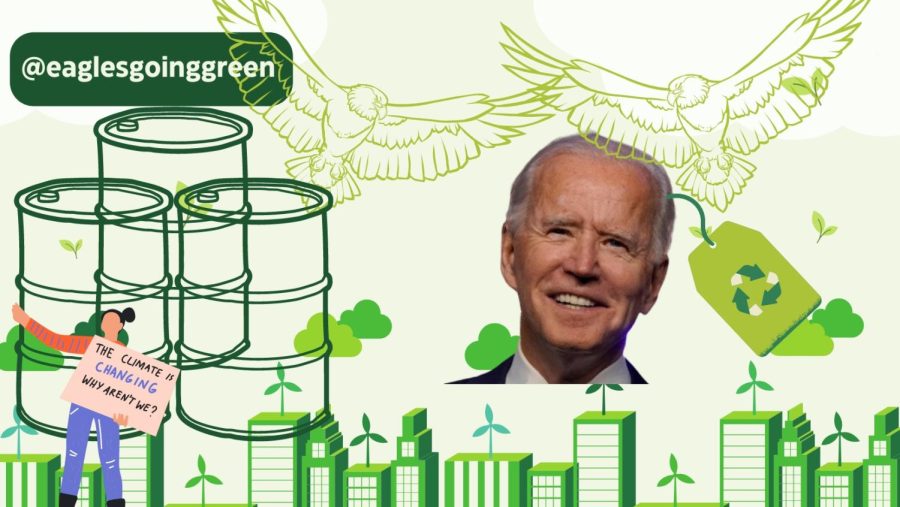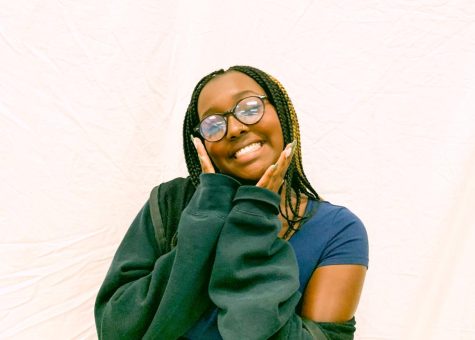Eagles Going Green: Co-Presidents Share Their Thoughts on the Willow Project
April 14, 2023
With the formal approval of the Willow Project from President Biden on March 13, many are left scattered and shattered with the damage and impact the gas and oil emissions will leave on the earth. While the impact of students at John Adams may seem small, bettering and protecting the environment is something students all around the world can join together to accomplish. Two students, Olivia Purcell and Eaven Kelly, Co-Presidents of the John Adams recycling club, Eagles Going Green (EGG) have shared their insight on the Willow project and what students can do to better help the environment.
Both juniors, Purcell and Kelly have been involved in EGG since their freshman year. With their longing to lessen carbon footprint and act on the life-altering disruptions of the ecosystems left them to take lead as Co-Presidents their sophomore year.
“Being scientifically minded, my ardent interest in helping the environment has grown from the ever-worsening statistical projections about the world’s impending uninhabitability.” Kelly said.
Commonly depicted, both Purcell and Kelly feel strongly about the Willow Project and the negative effects that will be produced from the plan. According to The New York Times, 600 million barrels of oil will be extracted from United States federal grounds and taken to the Natural Petroleum Reserve in Alaska. Purcell expressed her understanding with the angles taken for this new development such as more job positions and resources lying within the United States, but the ultimate approval was disheartening. The oil, not only hurting the atmosphere through water and soil, will ultimately harm the physical health of all persons.
“I feel it is a step backwards in terms of reducing fossil fuel emissions and making the United States more eco-friendly.” Purcell said.
Through the John Adams community, students in this generation seem to be more environmentally aware and advocating for a safer and healthier environment. Though climate change will continue to exist, Purcell hopes more students will be aware of the individual impact they leave on the environment.
“Sadly, climate change is not going away anytime soon, but it can be reduced or at least slowed down.” Purcell stated .
As students at John Adams, there are always ways in which you can reduce your carbon footprint and live more sustainable. Both Purcell and Kelly have shared ways in which they strongly urge students to work towards, helping keep not only our school environment clean, but our world as a whole. Purcell suggests students take shorter showers, switch lamps and lights to LED bulbs, adventure with biking or walking when possible and supporting local small businesses. When shopping for a new wardrobe, stray away from fast fashion shops like SHEIN and ROMWE and substitute with second hand thrift stores. Invest in reusable grocery bags, straws and water bottles for at home and on the go. For students wanting to get further involved, explore and volunteer at local organizations or communities that promote and focus on sustainability.
Purcell and Kelly have recently taken on the new initiative of EcoBricking which includes collecting plastic bottles to repurpose instead of landing in landfills. Within the first week, Kelly noted the eye opening number of plastic waste just within classrooms around John Adams.
“Seeing the amount of plastic bottles that are discarded on a weekly basis has been absolutely jarring,” Kelly said.
Through this, advice Kelly would give to the John Adams community would be to be conscious and active about reducing negative environmental impacts. Using just one bottle a day might not seem like a big deal, but undoubtedly using plastic, a non-biodegradable material can quickly accumulate hazardous pollution.
“I believe that it is our collective responsibility to be conscientious citizens of Earth, and I will continue to work hard to help lead that charge in my community.” Kelly noted.
If you or someone you know are interested in helping promote the negative effects of the Willow project, visit sites such as Change.org and Earthjustice to sign petitions and learn more.



